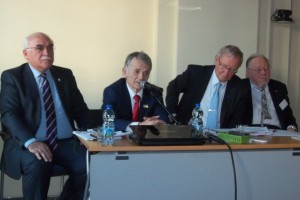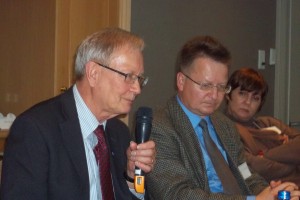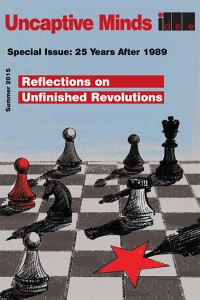
Veterans of the 1989-91 Revolutions — Isa Gambar (far left), Mutafa Dzhemilev, Tunne Kelam, and Vytautas Landsbergis — at the IDEE Seminar “25 Years After 1989.”

Tunne Kelam from Estonia (speaking), Vincuk Viacorka from Belarus, and Tatiana Vaksberg from Bulgaria during the session “Revolution, Evolution, Devolution.”
Special Issue of Uncaptive Minds
25 Years After 1989–91:
Reflections on Unfinished Revolutions
Seminar Proceedings
The special issue of Uncaptive Minds includes the edited proceedings—the full papers, responses, and discussion of participants—from the Institute for Democracy in Eastern Europe’s seminar titled “25 Years After 1989: Time for Reflection on Unfinished Business.” A separate IDEE Special Report provides a summary of the findings and recommendations and descriptions of the individual sessions.
The seminar, organized in Warsaw, Poland on October 3–5, 2014, included 22 veterans of the 1989–91 Revolutions from Eastern Europe and the nations that gained independence from the former Soviet Union, individuals who continue to play significant roles in their countries’ political and social lives (see Profiles of Participants). The seminar was organized into seven thematic sessions, including “revolution, evolution or devolution,” constitutionalism and electoral choices, development of political parties and oppositions, decommunization and transitional justice, civic institutions and citizens’ participation, and media along with a middle and closing session on “What is the Unfinished Business?” (see Statement of Seminar and Program). For each session, a participant presented a paper with a country case study on the topic, following which there were one or two participant responses and dialogue among all the participants. The proceedings are being published under the title “25 Years After 1989–91: Reflections on Unfinished Revolutions.”
The individual seminar papers are also available in digital format here.
Uncaptive Minds
Uncaptive Minds was IDEE’s journal of information and analysis on Eastern Europe published between 1988 and 1997 (nine volumes and 34 issues). Uncaptive Minds is the most comprehensive journal from this period about the transition from communism in Eastern Europe written by those in the region bringing about democratic change. It remains important both for its historical content—a single source where one can find the full range of opposition and democratic voices in the region during one of the most important periods of political transformation in world history—and also for its current relevance. Many of the issues being discussed today in the region were first identified in Uncaptive Minds. As noted above, IDEE has issued a special issue on the occasion of its 25 Years After 1989 seminar project to publish a special issue with the full proceedings of the seminar under the title “Reflections on Unfinished Revolutions.” Many of the participants in the IDEE seminar were contributors to the earlier volumes. (See also Uncaptive Minds Digital Archives: Selected Issues for digital copies of the first three issues from 1988, vol. 1. IDEE hopes to post the full digital archives as part of its new web site.)*
*Print versions of Uncaptive Minds may be ordered from IDEE, either individually (at $10 per issue plus postage and handling) or in a full set (at $300 plus postage and handling). Please make requests to [email protected] or order through this web site’s PayPal link. The publication is also available at many major university and public libraries in the U.S. and parts of Western and Eastern Europe.
Selected Seminar Questions
• In countries where elections became generally free, fair, and normal, why have the transitions from communism been so incomplete and the role of non-democratic parties so strong?
• Why is civic life and citizens’ participation in the new democracies so weak?
• What happened to the dream of independent media and other basic democratic institutions?
• What was the role of Russia in preventing a broader expansion of liberal democracy in the region and what role did former communist elites play in re-instituting authoritarian models?
• What role did the West play? In what areas was it positive and in which was it negative?
• What were the missed opportunities and what are the prospects today for advancing democratic freedom?
• In the face of a revanchist Russia, what can be done to strengthen the democratic transitions in East Central Europe, Baltic, and Balkan countries and what should be done to further democratic progress in the rest of the “post-Soviet space” so that they are not permanently relegated to dictatorship and Russian domination?
Uncaptive Minds
Special Issue
Seminar Proceedings (full)
Table of Contents and Introduction
Theme 1
Revolution, Evolution, or Devolution
Theme 2
Constitutions, Electoral Choices & Their Consequences
Theme 3
Post-Communist Development of Political Parties
Theme 4
Panel: What is the Unfinished Business?
Theme 5
Decommunization and Transitional Justice
Theme 6
Civic Institutions, Citizens’ Participation
Theme 7
What Happened to the Dream of Independent Media?
Closing Session
What is the Unfinished Business?
Appendices
Profiles of Participants and Program
In Memoriam
Miljenko Dereta

